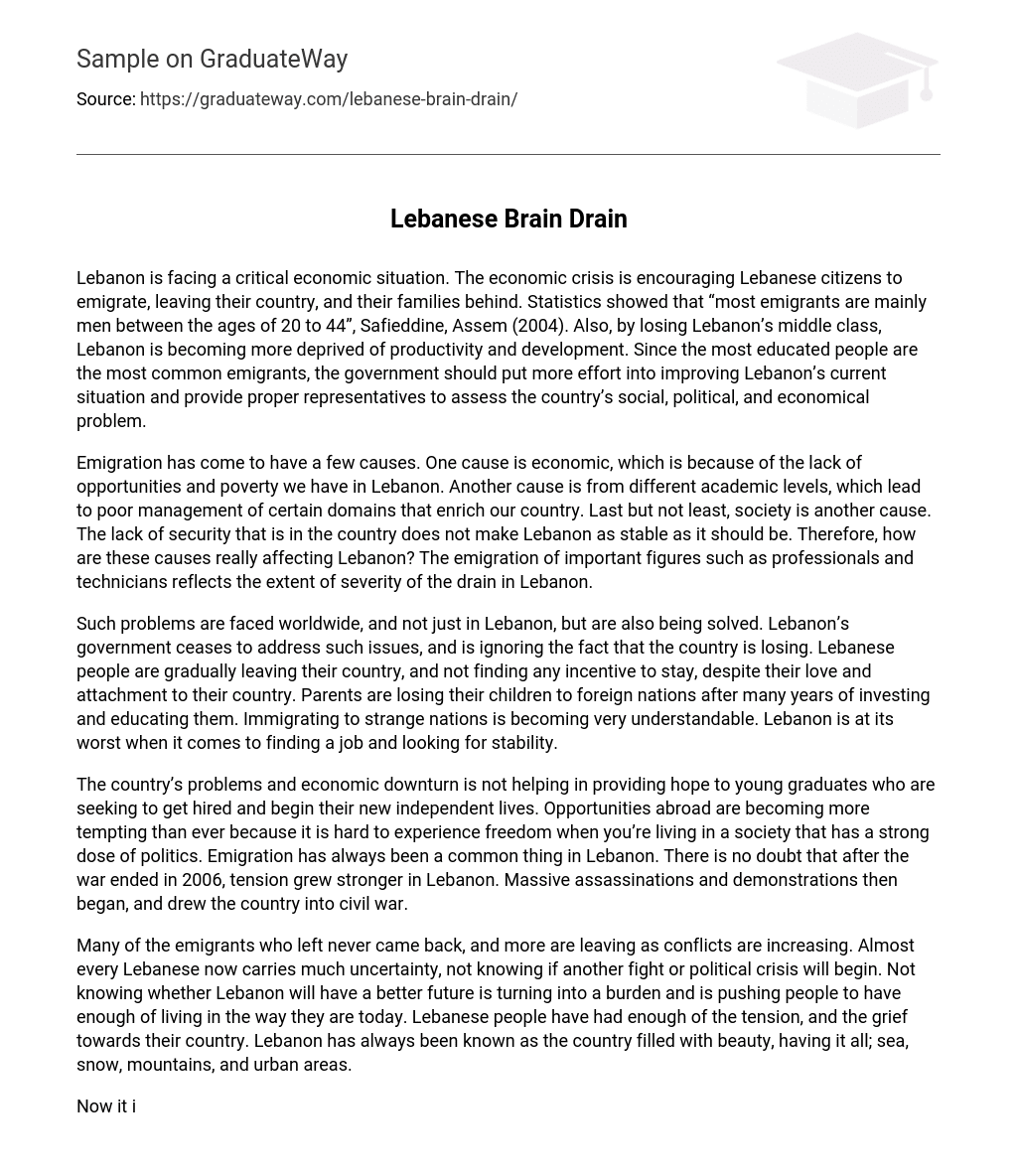Lebanon is facing a severe economic crisis, leading many citizens to contemplate emigration and separation from their families. Safieddine’s (2004) data reveals that the majority of emigrants are men aged 20 to 44. This outflow of educated individuals, specifically from the middle class, is detrimentally affecting Lebanon’s productivity and progress. Consequently, it becomes crucial for the government to adopt proactive measures in tackling the nation’s social, political, and economic issues.
Emigration in Lebanon has several causes, including economic factors like the lack of opportunities and widespread poverty. Additionally, different academic levels contribute to poor management in various domains that could otherwise benefit our country. Moreover, society plays a role as the lack of security undermines Lebanon’s stability. Consequently, these causes significantly impact Lebanon as evidenced by the emigration of key professionals and technicians, highlighting the severity of the drain on the country.
Despite being a global issue, the problems faced in Lebanon are being addressed and resolved. However, the government of Lebanon is failing to acknowledge these issues and disregard the country’s decline. The Lebanese people, despite their deep love for their nation, are leaving gradually and without any motivation to stay. This has resulted in parents losing their children to foreign countries after years of investing in their education. The decision to immigrate to unfamiliar nations is becoming increasingly justifiable. Finding employment and stability in Lebanon is currently at its lowest point.
The struggling economy and prevailing issues in the country are making it difficult for young graduates to find hope in securing employment and starting their own lives. With a society that is heavily influenced by politics, it becomes challenging to experience true freedom. As a result, opportunities overseas are becoming increasingly attractive. Lebanon has a history of emigration, and following the end of the war in 2006, tensions escalated, leading to massive assassinations and demonstrations, ultimately pushing the country into a civil war.
Many emigrants who left Lebanon never returned, and more people are leaving as conflicts escalate. The Lebanese population is filled with uncertainty, unsure if another fight or political crisis will erupt. The unknown future of Lebanon is becoming a heavy burden, prompting people to grow tired of their current way of life. The Lebanese have reached their limit with the tension and sorrow plaguing their country. Despite its reputation as a beautiful country with everything – from the sea to snow-capped mountains and bustling urban areas – Lebanon has become a place many seek to escape.
Despite the potential of Lebanon, its government and politicians lack unity, leading to a loss of hope. Families in the region desire a brighter future but are unsure if it will ever come. The allure of better living conditions and political stability abroad is harming our country’s economy. Instead of using their skills and expertise to contribute to their homeland, our graduates and educated individuals are tempted by opportunities overseas. It is crucial for them to invest their time and effort into developing the country they represent.
Educated people must remain and support their country, as without them, there will be no one left to do so. A strategy needs to be devised to enhance Lebanon’s progress. The country’s $58 billion debt is impeding economic growth, necessitating urgent measures to rescue the nation and boost its financial resources. Granting privileges to emigrants connected to Lebanon is a way to fortify our nation. Additionally, encouraging domestic investments and greater community involvement are other effective approaches.
Lebanon is highly politicized, resulting in a significant lack of trust among citizens towards the government. This lack of trust negatively affects people’s investment attitudes. Additionally, Lebanon’s education problem compounds the damage being done. Educated individuals struggle to find suitable employment opportunities within the country, often pushing them to seek work abroad. Moreover, the inadequate quality of education in Lebanon contributes to unequal literacy rates, representing a major issue affecting the country.
When a significant portion of individuals lack proper education and fair treatment from the government, they often become rebels within their own nation. These individuals blindly follow sects without understanding the consequences of their actions. Consequently, these individuals cause disturbances on the streets, perpetuated by their so-called political “leader.” This behavior ultimately tarnishes the country’s reputation while further dividing its citizens instead of uniting them.
Politicians should serve as positive examples for those who admire them because they possess the greatest influence at present. If politicians and national leaders can accomplish this, there may be a chance to unite people and improve our country. The achievement of Lebanese individuals abroad in honing their abilities fills us with pride. It serves as a means of showcasing Lebanon as a nation and demonstrating the capabilities of the Lebanese population to the global community. However, once these individuals begin to prioritize life outside their homeland without any intention of returning, it marks the onset of a crisis.
Leaders and strong figures in Lebanon must work towards restoring order and preserving the beauty of the country. It is also crucial for them to ensure fair and respectful treatment for all individuals, allowing us all to take pride in our Lebanese identity. Moreover, they should empower younger generations with the belief that they can have a prosperous future within their own homeland, making valuable contributions without relying on nepotism. The migration from Lebanon adversely affects everyone involved as people leave their native land, abandoning their emotional ties with uncertainty regarding their potential return.
Those who plan to leave their families behind deserve to have hope and better opportunities. If we don’t work together for a better future, those who emigrate will continue to do so, taking away educated individuals and the next generation of Lebanon. Consequently, Lebanon will have nothing and no one to care for.
References: Safieddine, Assem (2004, February 23). Brain Drain or Brain Gain?. The Daily Star Ghattas, Kim (2007, February 2). Lebanon’s Brain Drain Alarm. BBC News Sassine, Georges (2011, December 12). Don’t Let Lebanon’s Diaspora Go to Waste. The Daily Star





